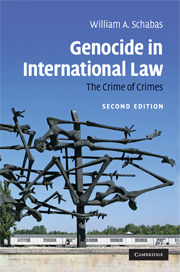Book contents
- Frontmatter
- Contents
- Preface to the first edition
- Preface to the second edition
- Acknowledgments
- List of abbreviations
- Introduction
- 1 Origins of the legal prohibition of genocide
- 2 Drafting of the Convention and subsequent normative developments
- 3 Groups protected by the Convention
- 4 The physical element or actus reus of genocide
- 5 The mental element or mens rea of genocide
- 6 ‘Other acts’ of genocide
- 7 Defences to genocide
- 8 Prosecution of genocide by international and domestic tribunals
- 9 State responsibility and the role of the International Court of Justice
- 10 Prevention of genocide
- 11 Treaty law questions and the Convention
- Conclusions
- Appendix: The three principal drafts of the Convention
- Bibliography
- Index
8 - Prosecution of genocide by international and domestic tribunals
Published online by Cambridge University Press: 07 July 2009
- Frontmatter
- Contents
- Preface to the first edition
- Preface to the second edition
- Acknowledgments
- List of abbreviations
- Introduction
- 1 Origins of the legal prohibition of genocide
- 2 Drafting of the Convention and subsequent normative developments
- 3 Groups protected by the Convention
- 4 The physical element or actus reus of genocide
- 5 The mental element or mens rea of genocide
- 6 ‘Other acts’ of genocide
- 7 Defences to genocide
- 8 Prosecution of genocide by international and domestic tribunals
- 9 State responsibility and the role of the International Court of Justice
- 10 Prevention of genocide
- 11 Treaty law questions and the Convention
- Conclusions
- Appendix: The three principal drafts of the Convention
- Bibliography
- Index
Summary
Genocide may be prosecuted by international or national courts. The preference of international law for the latter can be seen in the decision of the drafters of the Convention to establish an obligation to repress genocide without at the same time creating an international jurisdiction, although such a possibility was certainly contemplated and, indeed, expected at some time in the future. It is also evident in the principle of ‘complementarity’ which defines the operations of the International Criminal Court, established in 2002 following the entry into force of the Rome Statute. Pursuant to this principle, genocide offenders are, preferably, to be tried before domestic or national courts. Only when these fail should the international jurisdiction become operational.
From a policy standpoint, however, one or the other system may not always be preferable for genocide prosecution. Where a domestic judicial system operates in an effective manner, it may be quite capable of dealing appropriately with the crimes of the past. But, sometimes, a domestic judicial system will be operational yet require, for its own credibility, that some international trials be held to deal with major cases. Rwanda chose this approach when, in 1994, it requested that the Security Council establish an international criminal court. Accordingly, the Security Council resolution creating the International Criminal Tribunal for Rwanda stressed ‘the need for international co-operation to strengthen the courts and judicial system of Rwanda, having regard in particular to the necessity for those courts to deal with large numbers of suspects’.
- Type
- Chapter
- Information
- Genocide in International LawThe Crime of Crimes, pp. 400 - 490Publisher: Cambridge University PressPrint publication year: 2009



